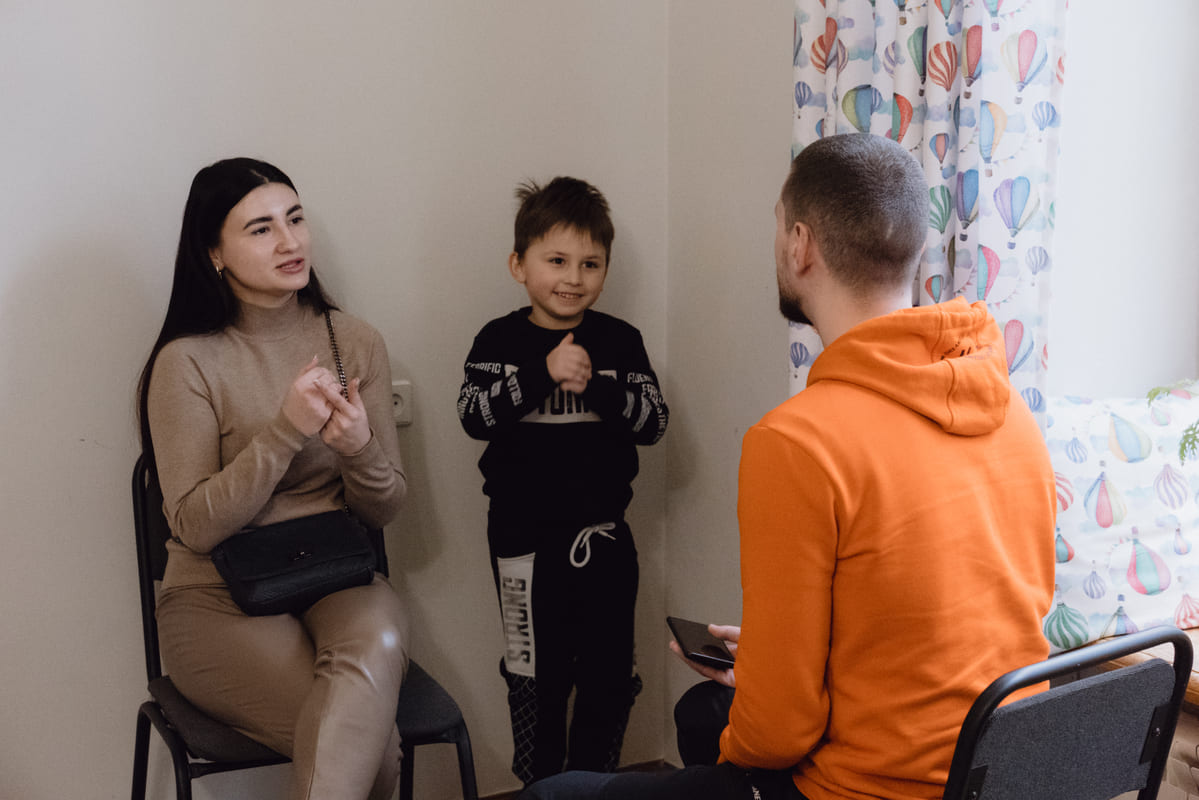How the "Eva" Center works with a child with autism
In March 2023, the team from the "Techiia Foundation" visited the "Eva" Inclusion and Correction Center, whose activities have been funded for several years. From that visit, a few inspiring stories remain. One is about Sofia, who conquered cancer and is building a social life. Another is about little Olia, who has a severe form of cerebral palsy and is literally learning to breathe and turn her head with the help of talented professionals at "Eva."
Today, we will share another story — the story of a boy named Pavlo, whom the Center is helping to integrate his developmental peculiarities with the surrounding world.

Diagnosis at one and a half years old
We meet Pavlo and his mother, Daryna, in the lobby of the "Eva" Center. There are toys all around that the boy eagerly examines, hiding behind his mother.
Pavlo has childhood autism. He doesn't speak and has never spoken. His communication is limited to short vocalizations and active gestures. For Pavlo, putting letters into syllables and syllables into sentences is a challenging task, marked with a star. "Dad" is one of the few words he can say.

Pavlo runs around the room and makes a noise. His mother explains that it's a typical state for the child, then tries to get him to sit on her lap. But in vain — Pavlo is already running towards the toys. He's intrigued by a large plastic motorcycle.
Daryna says that the child was born healthy despite a difficult delivery. Pavlo grew up as an active and lively boy, enjoying games and drawing and enthusiastically looking at children’s books.
After the fourth DTaP vaccine, the boy started regressing. He was only one and a half years old at the time. The parents noticed that the child became less responsive to his surroundings and became more withdrawn. They sought help from specialists who diagnosed him with autism. Since then, Pavlo's life and that of his family have changed dramatically.
First attempts at rehabilitation
The parents immediately began searching for a specialized rehabilitation center, and they found one in their hometown of Kramatorsk.
"Finding something similar in a small town was a miracle, without exaggeration," recalls Pavlo's mother. "It was difficult to come to terms with the fact that we had to apply for disability status for our child, but there were no other options to enroll him in a center."

The center had speech therapists, massage therapists, and other specialists working with the child. However, Pavlo didn't stay at the center for long. The intensifying shelling in Kramatorsk, week after week, forced the family to leave the city and relocate.
After several overnight stays in different cities, Daryna, her husband, and Pavlo settled in Poltava. There, the family was fortunate to find a local rehabilitation center. Due to their child's disability, his attendance was free of charge. However, they couldn't establish a stable presence there either, as the center faced funding issues, resulting in the cancellation of sessions. While the parents could afford to pay, Pavlo received private lessons from specialists.

Daryna doesn't remember how or when she learned about "Eva." She says she clung to any opportunity to help her son and filled out dozens of applications. The call from the administration inviting her to join the new session of the center coincided with her birthday as if it were a gift. She immediately agreed to join.
The "Eva" Effect
At the time of our conversation, Daryna and her son have been living near the "Eva" center on the outskirts of Kyiv for two months. Daryna admits that being alone with her child 24/7 is not easy. In this regard, the center is a lifesaver, as it provides her with a chance to take a break, interact with other parents, or attend to other matters.
The center has specialists in physical therapy, neuro correctional psychology, speech therapy, and psychology working with Pavlo. Daryna and Pavlo are busy visiting "Eva" at least four days a week. When someone else from the center's attendees cannot make it, Daryna and Pavlo gladly take additional sessions.

Like most of the children at "Eva," Pavlo's favorite activity at the center is swimming in the pool. According to Daryna, it is primarily thanks to the coach, Maksym, that Pavlo enjoys it so much. "He is a person with a special talent," she says. As if by a wave of a magical wand, Pavlo calms down and diligently performs all the tasks given by his coach. However, in everyday life, any attempts to make him do something against his will are almost doomed to failure. Although only two months have passed, Pavlo's progress is impressive — he can swim confidently. Daryna is already looking for a swimming pool in Poltava to continue the sessions after the course is over.

Daryna says that during the sessions, Pavlo has become much more disciplined. At home, she constantly works on making him more independent.
"I try to make him do as many things as possible by himself: dressing, preparing everything he needs for the sessions — basic everyday tasks. Independence is probably our main goal today," sums up the mother.

